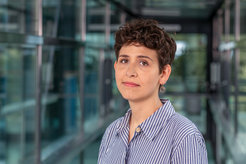Elisa Maggio wins Laura Bassi Prize and thesis award
The Italian Physical Society and the Sapienza University of Rome honor postdoctoral researcher at AEI Potsdam
Elisa Maggio, a Marie Curie Fellow at the Max Planck Institute for Gravitational Physics (Albert Einstein Institute, AEI) in the Potsdam Science Park, will receive two prizes, one of them for her doctoral thesis, which has already won three awards. The Italian Physical Society named her the winner of this year’s Laura Bassi Prize for early career women in physics. Next spring she will additionally receive one of the 2023 thesis prizes from the Sapienza University of Rome.

Two awards
“I am truly humbled and honored to receive these two prestigious awards that not only recognize my research, but also celebrate the contributions of women in science,” says Elisa Maggio. “I am thrilled to be part of a community that values and promotes excellence in research, and I look forward to continuing my contributions to tests of general relativity with gravitational waves.”
The Laura Bassi Prize for Women in Physics has been awarded at a ceremony on 9 September 2024, during the 110th National Congress of the Italian Physical Society in Bologna. The prize includes a certificate and a monetary award of 2000 euros. According to the Italian Physical Society, Elisa Maggio receives the prize “for her significant theoretical contributions to gravitational-wave physics and her scientific responsibility role for the future space interferometry experiment LISA”.
The 2023 thesis prizes from the Sapienza University of Rome will be presented in spring 2025. They are awarded for the best doctoral theses defended at Sapienza University of Rome in the years 2021 and 2022. The prize consists of a certificate and the publication of the thesis by Sapienza University Publisher.
Gravity in extreme situations

Elisa Maggio studies how gravity behaves in extreme situations, such as when two very dense objects collide, by predicting and observing the gravitational waves produced in these events. Black holes are regions in space where gravity is so strong that nothing, not even light, can escape. The “surface of no return”, where gravity becomes too strong, is called the event horizon. Alternative theories of gravity suggest the existence of objects without a horizon. These objects would be very dense and have a strong gravitational pull, but they would not trap everything inside like a black hole. In her PhD research, Maggio studied what would happen if two black holes merged to form one of these horizonless objects. She calculated what kind of gravitational-wave signal would be sent out into space. Detecting a gravitational-wave signal matching Maggio’s predictions for a horizonless object, would show the limits of Einstein's theory and would be an important discovery that could help us better understand the Universe and the laws of physics.
The Laser Interferometer Space Antenna (LISA) will observe signals that differ significantly in strength, number, and nature from those detected by ground-based detectors. This will open up a whole new part of the gravitational wave spectrum, and enable novel ways to study compact objects and test alternative theories of gravity.
The awardee
Elisa Maggio studied physics at La Sapienza University in Rome, Italy, where she received her PhD with a thesis entitled “Probing new physics on the horizon of black holes with gravitational waves” in 2022. For her thesis she received prizes by the Amaldi Research Center at La Sapienza University in Rome, the University of Pavia and by the Italian Society for Relativity and Gravitational Physics, and by the Italian National Institute for Nuclear Physics. Since November 2021, she has been a Leibniz Fellow in the Astrophysical and Cosmological Relativity Department of Prof. Alessandra Buonanno at the Max Planck Institute for Gravitational Physics (Albert Einstein Institute) in Potsdam. Between 2021 and 2024 Maggio’s position was supported by the funds of the 2018 Gottfried Wilhelm Leibniz Prize of the Deutsche Forschungsgemeinschaft (DFG). Since May 2024 she is a Marie Skłodowska-Curie Fellow with a research project titled “Testing the horizon of black holes with gravitational waves” (ThorGW).
The “Laura Bassi” Prize for Women in Physics
The “Laura Bassi” Prize for Women in Physics was established by the Italian Physical Society, in order to strengthen the presence of women in the world of Physics and Science, and in order to enhance the value of talented female researchers. The award consists of two prizes, each including 2000 euros and a certificate, to be given to two female physics graduates who have particularly distinguished themselves in the last 5 years with their research. The prize is awarded to one early career and one mid to full career researcher.
The Sapienza University of Rome thesis prizes
The Sapienza University of Rome thesis prizes 2023 are awarded for the best doctoral theses discussed at Sapienza University of Rome in the years 2021 and 2022. The selection is open to theses that received the “excellent with honours” grade in the examination for the PhD degree. The award consists of a certificate, which will be presented to the winners in a public ceremony, and the open access publication of the thesis by Sapienza University Publisher.













